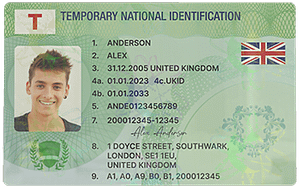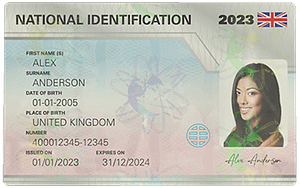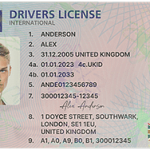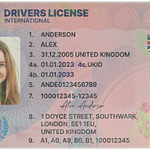Fake ID cards are a serious problem in society, with far – reaching negative consequences. They can be used for illegal activities such as underage drinking, identity theft, and fraud. Online marketplaces, which have become an integral part of the modern e – commerce landscape, have a significant role to play in curbing the sale of these counterfeit documents.
Understanding the Fake ID Card Problem
Fake ID cards are not just a novelty item for teenagers looking to buy alcohol or get into clubs. They are a tool for criminals. Identity thieves can use fake IDs to open bank accounts, apply for credit cards, and commit other financial crimes. In addition, illegal immigrants may use fake IDs to gain access to jobs and social services. The production and sale of fake ID cards also fuel organized crime networks, which profit from this illegal trade.
The demand for fake ID cards has led to a booming underground market. With the advent of the internet, it has become easier for sellers to reach a wider customer base. Online platforms have, unfortunately, provided a new avenue for the sale of these counterfeit items. However, they also have the potential to be part of the solution.

The Role of Online Marketplaces
Monitoring and Detection
One of the primary roles of online marketplaces is to monitor and detect the sale of fake ID cards. They can use advanced algorithms and machine – learning techniques to scan listings for keywords and phrases associated with fake ID sales. For example, terms like “fake driver’s license,” “counterfeit ID,” or “undetectable fake ID” can be flagged for further investigation. These platforms can also analyze images on their sites to identify any suspicious items that may resemble fake ID cards.
Marketplaces can also encourage users to report suspicious listings. By providing an easy – to – use reporting mechanism, they can tap into the power of their user community. When a user reports a listing, the marketplace can quickly review it and take appropriate action, such as removing the listing and suspending the seller if necessary.
Verification of Sellers
Online marketplaces can implement strict seller verification processes. Before allowing a seller to list items on their platform, they can require proof of identity, business registration (if applicable), and other relevant documents. This helps to ensure that only legitimate sellers are operating on the platform. In the case of items that could potentially be associated with fake ID sales, such as printing equipment or laminating materials, additional checks can be carried out to verify the intended use of these products.

Furthermore, marketplaces can maintain a database of banned sellers. If a seller has been found to be involved in the sale of fake ID cards or other illegal items, their information can be added to this database, preventing them from creating new accounts and continuing their illegal activities on the platform.
Collaboration with Law Enforcement
Online marketplaces can play a crucial role in collaborating with law enforcement agencies. When they detect suspicious activity related to fake ID sales, they can share relevant information with the authorities. This includes details about the seller, such as their IP address, contact information, and transaction history. Law enforcement can then use this information to launch investigations and make arrests.
Marketplaces can also participate in joint initiatives with law enforcement to raise awareness about the dangers of fake ID cards. They can display public service announcements on their platforms, warning users about the legal and social consequences of buying or selling fake ID cards. This not only helps to deter potential buyers and sellers but also educates the general public about the issue.
Policy Enforcement
Online marketplaces need to have clear and strict policies against the sale of fake ID cards. These policies should be prominently displayed on their platforms and easily accessible to users. Sellers should be made aware of the consequences of violating these policies, which can include account suspension, legal action, and the seizure of funds. Regular audits can be conducted to ensure that these policies are being adhered to.
When a violation is detected, the marketplace should take swift and decisive action. This may involve removing the listing, refunding the buyers (if applicable), and reporting the incident to the relevant authorities. By consistently enforcing these policies, marketplaces can create a hostile environment for fake ID sellers.
Challenges Faced by Online Marketplaces
Complexity of the Problem
The fake ID card market is highly complex. Sellers are constantly evolving their methods to avoid detection. They may use code – words or encrypted messaging to communicate with potential buyers, making it difficult for marketplaces to monitor their activities. In addition, the production of high – quality fake ID cards has become more sophisticated, with some counterfeits being almost indistinguishable from the real thing. This makes it challenging for marketplaces to accurately identify fake ID – related listings.
Global Nature of the Problem
Online marketplaces operate on a global scale, which adds to the complexity of curbing fake ID sales. Sellers can be located in different countries, and laws regarding fake ID cards vary from one jurisdiction to another. This makes it difficult for marketplaces to enforce consistent policies and for law enforcement to take effective action. Coordination between international law enforcement agencies and marketplaces is crucial but often challenging to achieve.
Balancing User Privacy and Security
While it is important for online marketplaces to detect and prevent the sale of fake ID cards, they also need to balance this with user privacy concerns. When implementing monitoring and detection measures, marketplaces need to ensure that they are not violating the privacy rights of their users. For example, the use of algorithms to scan user communications should be done in a way that respects user privacy while still being effective in detecting illegal activities.
Solutions to the Challenges
Enhanced Technology
Online marketplaces can invest in more advanced technology to combat the complexity of the fake ID problem. This includes developing more sophisticated machine – learning algorithms that can detect code – words and encrypted messages related to fake ID sales. Image recognition technology can also be improved to better identify fake ID – like items. By staying ahead of the curve in terms of technology, marketplaces can increase their effectiveness in detecting and preventing fake ID sales.
International Cooperation
To address the global nature of the problem, there needs to be increased international cooperation between law enforcement agencies and online marketplaces. This can involve the sharing of intelligence, the development of common standards for detecting and prosecuting fake ID sales, and the establishment of joint task forces. International organizations can play a role in facilitating this cooperation and ensuring that all parties are working towards a common goal.
Privacy – Conscious Measures
Marketplaces can implement privacy – conscious measures in their monitoring and detection processes. For example, they can use anonymization techniques when analyzing user data to protect user privacy. They can also be more transparent about their data – collection and monitoring practices, explaining to users why these measures are necessary and how they are being carried out. This can help to build trust with users while still allowing marketplaces to effectively combat the sale of fake ID cards.
Common Problems and Solutions
- Problem: False Positives in Detection
Sometimes, the algorithms used by online marketplaces to detect fake ID – related listings may flag legitimate items as suspicious. For example, a seller of ID – card – sized photo frames may be wrongly flagged as a potential fake ID seller due to the use of certain keywords in their listing description.
Solution: Marketplaces can improve their algorithms to reduce false positives. They can use more context – based analysis, taking into account the overall nature of the seller’s business and the other items they are selling. In addition, they can provide an appeal process for sellers who have been wrongly flagged, allowing them to present evidence to prove the legitimacy of their listings.
- Problem: Sellers Evading Detection
Sellers of fake ID cards may find ways to evade detection by marketplaces. They may use new code – words, change their selling platforms frequently, or operate through proxy servers to hide their true identity and location.
Solution: Marketplaces need to be constantly vigilant and adapt their detection methods. They can collaborate with other marketplaces and industry groups to share information about new evasion techniques. In addition, they can work with internet service providers to identify and block IP addresses associated with known fake ID sellers.
- Problem: Lack of Awareness Among Users
Some users may not be fully aware of the legal and social consequences of buying or selling fake ID cards. This can lead to a higher demand for these counterfeit items on online marketplaces.
Solution: Marketplaces can launch awareness – raising campaigns. They can use their platforms to display educational content about the dangers of fake ID cards, including real – life examples of how they have been used in criminal activities. They can also partner with schools, community organizations, and law enforcement agencies to spread the message to a wider audience.
- Problem: Inadequate Seller Verification
Some online marketplaces may have weak seller verification processes, allowing fake ID sellers to slip through the cracks. This can be due to a lack of resources or a failure to implement proper checks.
Solution: Marketplaces should invest in more comprehensive seller verification processes. This can include conducting background checks on sellers, verifying their business licenses (if applicable), and cross – referencing their information with public databases. They can also use third – party verification services to add an extra layer of security.
- Problem: Slow Response to Reports
When users report suspicious listings related to fake ID sales, the response time of some marketplaces may be slow. This can give fake ID sellers more time to complete transactions and escape detection.
Solution: Marketplaces should establish a dedicated team to handle reports of suspicious activity. This team should be trained to quickly review reports and take appropriate action. They can also set up a system to prioritize reports based on the level of suspicion, ensuring that the most urgent cases are dealt with promptly.



